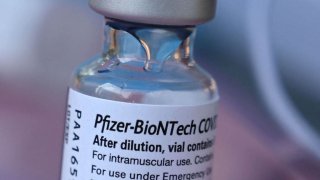
Pfizer has begun a study comparing its original COVID-19 vaccine with doses specially tweaked to match the hugely contagious omicron variant.
Pfizer and its partner BioNTech announced the study on Tuesday.
COVID-19 vaccine makers have been updating their shots to better match omicron in case global health authorities decide the change is needed.
While omicron is more likely than previous variants to cause infection even in people who’ve been vaccinated, it’s not yet clear that a change to the vaccine recipe is needed.
We're making it easier for you to find stories that matter with our new newsletter — The 4Front. Sign up here and get news that is important for you to your inbox.
The original vaccines still offer good protection against severe illness and death. Studies in the U.S. and elsewhere have made clear that adding a booster dose strengthens that protection and improves the chances of avoiding a milder infection.
“We recognize the need to be prepared in the event this protection wanes over time and to potentially help address omicron and new variants in the future,” Kathrin Jansen, Pfizer’s vaccine research chief, said in a statement.
The new U.S. study is enrolling up to 1,420 healthy adults, ages 18 to 55, to test the updated omicron-based shots for use as a booster or for primary vaccinations. Researchers will examine the tweaked vaccine’s safety and how it revs up the immune system in comparison to the original shots.
In one study group, about 600 volunteers who received two doses of the current Pfizer vaccine three to six months ago will receive either one or two omicron-based shots as boosters. Another 600 who’ve already gotten three regular doses of the Pfizer vaccine will be given a fourth dose of either the regular vaccine or the omicron-matched version.
The study also will enroll some unvaccinated volunteers who will receive three doses of the omicron-based vaccine.
___
The Associated Press Health and Science Department receives support from the Howard Hughes Medical Institute’s Department of Science Education. The AP is solely responsible for all content.

